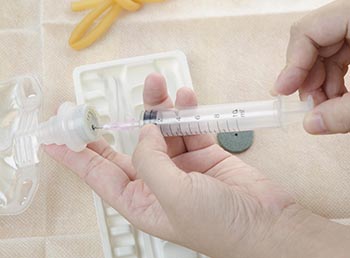 While standard therapy consists of daily oral doses of a cancer drug called cyclophosphamide, followed by azathioprine, an immunosuppressant often used in organ transplant, researchers showed that four infusions of a monoclonal antibody called rituximab over one month were as effective in providing remission of symptoms as standard therapy in patients with types of vasculitis associated with anti-neutrophil cytoplasmic antibodies (ANCA).
While standard therapy consists of daily oral doses of a cancer drug called cyclophosphamide, followed by azathioprine, an immunosuppressant often used in organ transplant, researchers showed that four infusions of a monoclonal antibody called rituximab over one month were as effective in providing remission of symptoms as standard therapy in patients with types of vasculitis associated with anti-neutrophil cytoplasmic antibodies (ANCA).Among patients receiving rituximab, 64 percent were in remission at six months, 48 percent at one year and 39 percent at 18 months, compared to 53 percent, 39 percent and 33 percent for standard therapy.
“The FDA approved rituximab for vasculitis based on our six-month data,” said Barri Fessler, M.D., associate professor of medicine in the Division of Clinical Immunology and Rheumatology and one of the study co-authors. “We’ve now followed these patients for 18 months, and results indicate that rituximab continues to be as effective as standard therapy.”
Fessler said these findings give physicians a powerful new option for treating vasculitis, which, while rare, can lead to severe organ damage and even death.
“It provides flexibility for patients and physicians,” she said. “For some patients, rituximab may be the more appropriate medication. Now we have a choice.”
Fessler says rituximab works by targeting B cells which have been implicated in vasculitis. Rituximab decreases the number of B cells, which promotes remission of symptoms.
UAB was one of nine study sites for this trial, and Fessler says they will continue to follow the patients who participated in the trial to examine long term outcomes.
Vasculitis is made up of a family of conditions. The types of vasculitis studied in this trial included granulomatosis with polyangiitis and microscopic polyangiitis, both associated with ANCA. They are rare diseases, affecting 10-20 persons in a million.